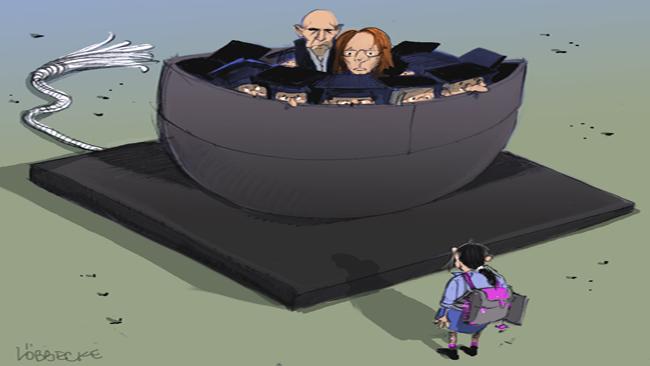
THE goal of the "Give a Gonski" campaign is not a revolution; it is a counter-revolution. Its targets are changes taking place in the Coalition states that bring greater autonomy to government schools, devolve more control from bureaucrats to parents and principals, and increase school choice.
Victoria's proposals, released last week, to provide every low-income family with a voucher redeemable in government and non-government schools, take those changes a dramatic step forward. That they have the teachers' unions in hysterics is unsurprising; but it is startling that the Gillard government, having spouted the rhetoric of choice, has now joined the unions in denouncing policies that would give less well-off parents a real right to choose.
The battle cry of these enemies of choice is that schools are underfunded; their panacea is throwing yet more taxpayer dollars at education. With those shekels would come shackles: increased centralisation that adds layers of bureaucracy while duplicating existing requirements in the states; and crucially, new limits on entry into teaching and on the opening of non-government schools.
Australian kids would gain nothing from that agenda. But the teachers' unions would be big winners, in the form of more jobs, higher pay and less demanding working conditions.
The long-term increase in teacher numbers is telling: school students account for exactly the same proportion of the population today as they did in 1951, but the share of teachers in the population has doubled. Telling too are the cost increases, with teacher wages per student in government schools rising, in real terms, by 33 per cent in the past decade alone.
Notoriously, what hasn't increased are the outcomes: it is producers, not consumers, who have captured most of the benefits of rapidly rising spending. And with billions more set to be spent, the unions want to capture them every bit as fully as they have in the past. Little wonder then that, like all cartels, they want to increase the barriers to entry into their sector.
The drive to tighten entry requirements into teaching would play into that strategy. So would restricting the scope to establish schools that compete with government schools, and minimising public funding to those that do. Drawn straight from the cartelisers' play-book, both proposals are inimical to the interests of students, parents and the nation.
To oppose stiffer accreditation isn't to suggest teachers don't need high-level skills. But now is the time to greatly broaden the pool from which teachers are drawn, not narrow it. True, some form of teacher licensure has been a feature of Western education since Roman times. However, in a society in which young people seem likely to have six jobs by age 40, it makes no sense to model teaching on the clergy - as a choice made, for life, at age 18.
Rather, teaching should be an option for groups as diverse as young graduates, mid-career professionals and highly skilled retirees - all of whom would be repelled by demands for traditional teaching qualifications. Yes, would-be teachers must have the competency essential to what they hope to teach; but that can't justify forcing them through a teacher training mill designed a century ago.
A freer educational labour market must also be a more demanding one. Most teachers want to teach well because teaching is their vocation. But some don't and some can't. Yet it remains virtually impossible for principals in government schools to fire under-achieving teachers. On average, out of 90,000 public sector teachers in NSW and Victoria, 10 are sacked each year for incompetence - far fewer than are dismissed for sexual offences.
The reality is that measurable attributes, such as experience and training, are poor predictors of teacher performance: studies suggest they account for barely 3 per cent of the variance in teachers' contribution to student outcomes. But principals know who can teach and who cannot: they need the ability to act on it.
And they need incentives to do so as well. That is where school choice comes in. Standardised tests only measure aspects of teaching outcomes, not the overall quality of schooling. Parents, however, can observe that quality and respond to it. Sure, not all will, just like not all shoppers properly assess value for money. But as in other competitive markets, if even only a few do, their behaviour protects the others, including through valuable cues the less well-informed can imitate.
The fear of losing even small numbers could therefore be a powerful motivator for principals, especially were MySchool used to publicise shifts in market share.
Thus unlocking choice would yield substantial gains. All else equal, students from countries where non-government schools receive substantial public funding outperform their counterparts by more than 30 per cent in the PISA tests that evaluate education systems worldwide.
And the benefits would be even greater for disadvantaged kids who, according to the Gonski report, suffer from being concentrated in underperforming government schools. The report admits there is no evidence increasing funding for those schools helps; surely, instead of wasting billions in so doing, equity would be better advanced by using vouchers to encourage new non-government schools to establish, and existing schools to expand, in those areas.
Whatever the answers to our schools' afflictions may be, they are unlikely to work equally well in all settings, for all children and in all hands. Diversity and choice are therefore crucial. Yet the teachers' unions would rather entrench their monopoly power.
That is understandable; the Gillard government, however, should know better than to endorse their stance, as Peter Garrett did on Friday. On the same day, Wayne Swan became the first Treasurer since Jim Cairns to attack contestability of government service delivery between the public and private sectors.
But the Gillard government is a sinking ship loaded with an endangered political species. Consumed with staying afloat, it no longer cares about the country's future. At this rate, the future soon won't care about it.



